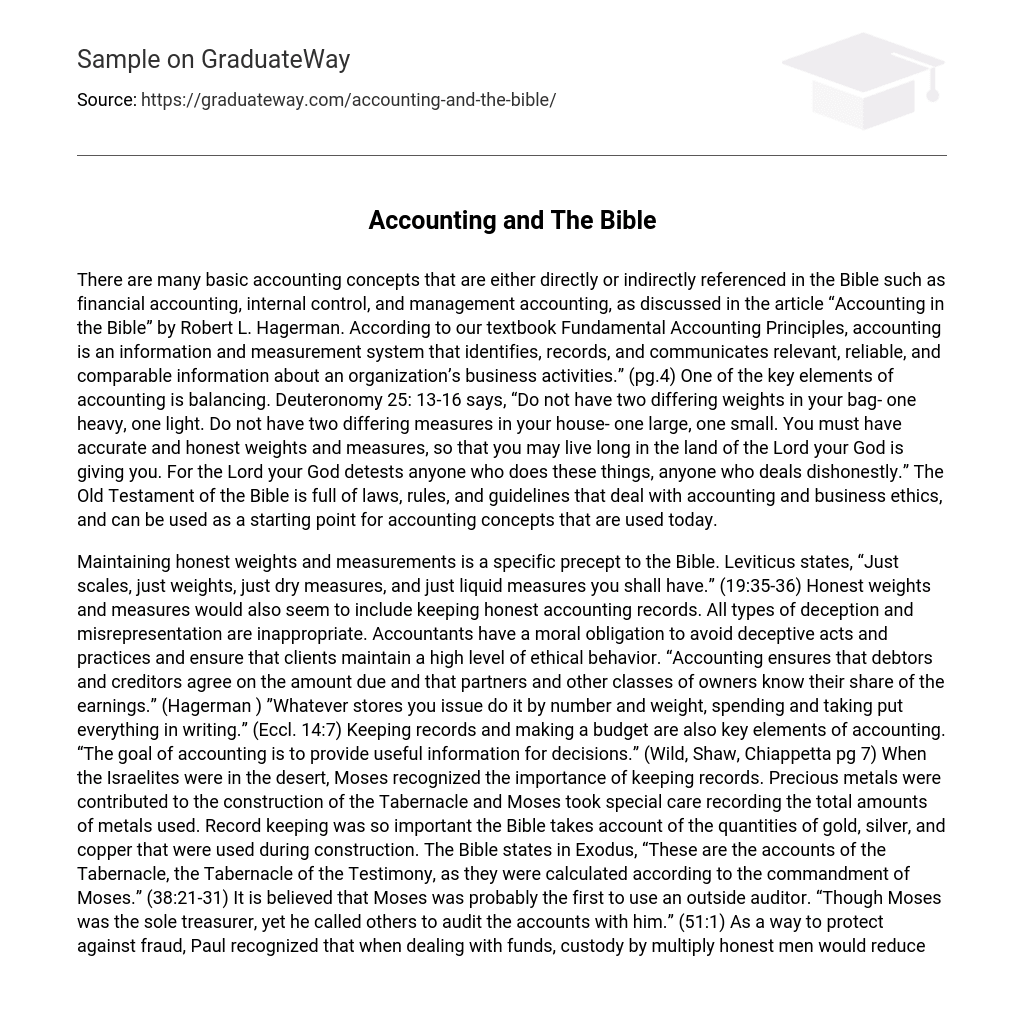There are many basic accounting concepts that are either directly or indirectly referenced in the Bible such as financial accounting, internal control, and management accounting, as discussed in the article “Accounting in the Bible” by Robert L. Hagerman. According to our textbook Fundamental Accounting Principles, accounting is an information and measurement system that identifies, records, and communicates relevant, reliable, and comparable information about an organization’s business activities.” (pg.4) One of the key elements of accounting is balancing. Deuteronomy 25: 13-16 says, “Do not have two differing weights in your bag- one heavy, one light. Do not have two differing measures in your house- one large, one small. You must have accurate and honest weights and measures, so that you may live long in the land of the Lord your God is giving you. For the Lord your God detests anyone who does these things, anyone who deals dishonestly.” The Old Testament of the Bible is full of laws, rules, and guidelines that deal with accounting and business ethics, and can be used as a starting point for accounting concepts that are used today.
Maintaining honest weights and measurements is a specific precept to the Bible. Leviticus states, “Just scales, just weights, just dry measures, and just liquid measures you shall have.” (19:35-36) Honest weights and measures would also seem to include keeping honest accounting records. All types of deception and misrepresentation are inappropriate. Accountants have a moral obligation to avoid deceptive acts and practices and ensure that clients maintain a high level of ethical behavior. “Accounting ensures that debtors and creditors agree on the amount due and that partners and other classes of owners know their share of the earnings.” (Hagerman ) ”Whatever stores you issue do it by number and weight, spending and taking put everything in writing.” (Eccl. 14:7) Keeping records and making a budget are also key elements of accounting. “The goal of accounting is to provide useful information for decisions.” (Wild, Shaw, Chiappetta pg 7) When the Israelites were in the desert, Moses recognized the importance of keeping records. Precious metals were contributed to the construction of the Tabernacle and Moses took special care recording the total amounts of metals used. Record keeping was so important the Bible takes account of the quantities of gold, silver, and copper that were used during construction. The Bible states in Exodus, “These are the accounts of the Tabernacle, the Tabernacle of the Testimony, as they were calculated according to the commandment of Moses.” (38:21-31) It is believed that Moses was probably the first to use an outside auditor. “Though Moses was the sole treasurer, yet he called others to audit the accounts with him.” (51:1) As a way to protect against fraud, Paul recognized that when dealing with funds, custody by multiply honest men would reduce the probability of fraud. (Hagerman) After sending Titus and two brothers to collect funds from the Corinthians, Paul praises the virtue of these men.
“We hope that in this way there will be no accusations made about our administering such a large fund; for we are trying to do right not only in the sight of God but also in the sight of men.”(2 Cor. 8:20) Accountants should behave in a manner that does not cause others to be suspicious. Another important element of accounting that can be found in the Bible is the subject of budgeting. Luke 14: 28-29 says, “Which of you here intending to build a tower would not first sit down and work out the cost to see if you had enough to complete it?” ”This quotation refers not only to project budgeting but also cash flow forecasts.” (Hagerman) Good financial planning is a part of wise stewardship. Wise decisions can be made with the confidence that God directs your every step as you seek His will in prayer, in Bible study, and in the Holy Spirit. There are several passages throughout the Bible that show a link to many modern day accounting concepts.
References
The Bible. New King James Version.
Hagerman, R. L. Accounting in the Bible. Accounting Historians Journal. Vol. 7.Retrieved from http://www.accountingin.com/accounting-historians-journal/volume-7-number-2/accounting-in-the-bible/ Wild, J.J., Shaw, K.W., Chiappetta, B. (2013) Fundamental Accounting Principles. Volume 1





